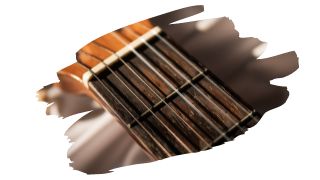Rosewood fretboards are becoming increasingly difficult to come across.
Traditionally used as the go-to timber for guitar fretboards, this tropical hardwood is becoming a rarity, thanks to CITES (Convention On The Trade Of Endangered Species) trade restrictions.
So, if you’re lucky enough to have a guitar with a fantastic Rosewood fretboard, treasure it…because it’s about to become one of your most rare and prized possessions.
With this in mind, if you want to keep playing on that Rosewood fretboard for years to come, you may need to start oiling it every once in a while.
That’s why, in this post, you’ll discover why Rosewood fretboards are almost always left unfinished…and what risks this puts on Rosewood drying out and cracking.
You’ll also find out what really goes into so called fretboard ‘lemon’ oils…as well as whether lemon oil is really safe enough to use on Rosewood.

This post may contain affiliate links to products that we receive a commission for (at no additional cost to you). Learn more here.
Do Rosewood Fretboards Even Need Oil In The First Place?
Fretboards made from naturally oily wood, (such as Rosewood), rarely need conditioning.
That’s because these oily lumbers are packed full of natural tree oils. So much so, that they’ll struggle to absorb fretboard oils anyway.
This is why Rosewood fretboards rarely seem to need conditioning oils. But, in certain circumstances, it might be worth applying one.
For example, in very dry desert-like climates, rosewood can dry out sooner rather than later. So, in this instance, it would be a good idea to apply fretboard oil onto Rosewood.
OK, Should You Oil A Rosewood Fretboard?
Yes, you should. However, you don’t need to oil it as frequently as other types of fretboards.
For example, an unfinished Maple fretboard would need oiling every six months to keep it hydrated. However, an unfinished Rosewood fretboard only needs oiling every 12 months.
Ideally, oiling Rosewood fretboards every 1-2 years is best practice, (although it may not even need to be oiled that frequently).
But Will Lemon Oil Dry Out A Rosewood Fretboard?
Pure lemon oil (straight from the lemon rind) is very acidic. So, pure lemon oil will bleach out your fretboard. What’s more, it can even go as far as to break down the very glue holding those frets in place.
But fretboard oils aren’t actually pure lemon oil. Instead, fretboard oil products, (that are listed as ‘lemon oil’), are really just mineral oil with a few lemon oil drops added for the aroma.
And What’s The Best Kind Of Conditioning Oil For A Rosewood Fretboard?
Use 100% Food Grade Mineral Oil.
You see, mineral oil is sourced from petroleum, so it won’t go off and go rancid. It isn’t acidic (like pure lemon oil). And it does not harden (like Linseed or Tung oil).
And, if you stick to applying just a few droplets of this stuff, it will rub right into Rosewood and rehydrate it.
And What Exactly Is Mineral Oil?
Mineral oil is a bit of a special oil for wood finishing. It’s one of only a handful of non-drying oils that can be reliably used as a wood finish.
Other non-drying oils, (such as Sunflower Oil or Vegetable Oil), can go rancid. However, mineral oil will never decay or go off. That’s because mineral oil is made from 100% petroleum, so this product never has an expiration date.
And, while there are many different petroleum by-products, food grade mineral oil is made from highly refined petroleum distillate. Which means that this refined version of mineral oil is so well filtered, it’s even safe for human consumption.
And How Long Should You Leave Mineral Oil On A Fretboard?
Well, the aim is to get the mineral oil to sink right down into the timber. This will take around 5-8 minutes (if you set and forget it).
However, you should only be rubbing in a droplet of oil at a time between each fret. You mustn’t saturate fretboards with mineral oil, otherwise you’ll make that guitar neck too greasy to play.
And How Often Should You Oil A Rosewood Fretboard?
If this were a Maple fretboard, you’d be eyeing every 6-12 months on the calendar. But Rosewood needs much less oil to keep from drying out.
So, if that Rosewood fretboard is unfinished, you should simply always be on the look out for any small cracks that might appear.
Those cracks are a sign that the wood needs conditioning. And for Rosewood, this can happen anywhere between 1 to 5 years.
Related Post: What Can You Use As A Fretboard Oil Substitute?
Can You Clean A Rosewood Fretboard With Lemon Oil?
Pure lemon oil should go nowhere near your fretboard. And even mineral oil ‘lemon oils’ aren’t suitable for cleaning fretboards either.
Conditioning oils are simply used for just that….conditioning.
Instead, you should use a mild solvent to clean your fretboard. Using water alone won’t be enough to remove oily dirt. However, using pure naphtha will work wonders at breaking down grime.
But, don’t overdo it. You only need a light dab of this solvent to really loosen grime up.
To Wrap Up, Here Are The 3 Key Takeaways From This Post…
- 1). Rosewood is a naturally oily wood that rarely needs any conditioning oil.
- 2). However, in very humid and/or hot climates, even Rosewood can become dry and cracked.
- 3). In which case, you can condition dry Rosewood fretboards using a touch of pure food grade mineral oil.
References
Furniture that destroys forests: crackdown on ‘rampant’ trade in rosewood | The Guardian

